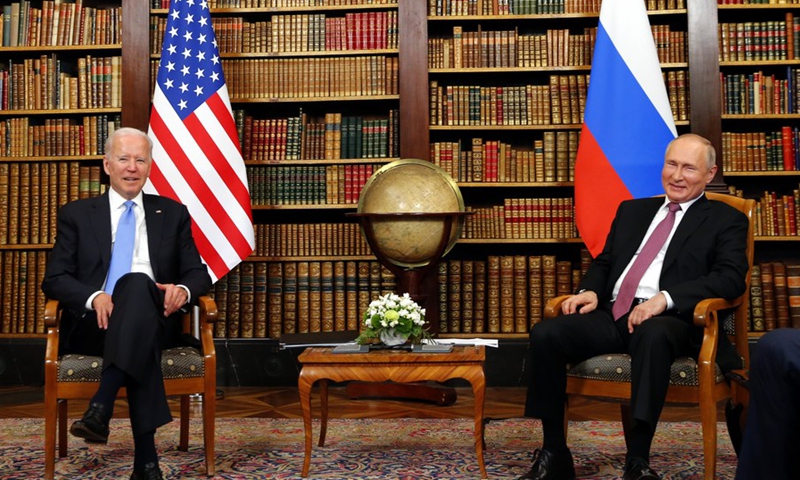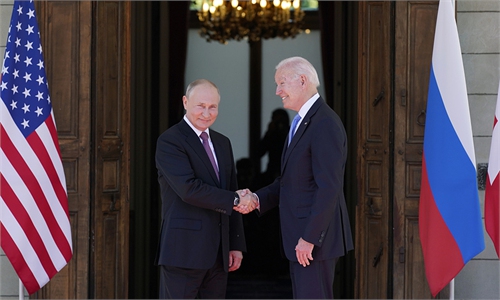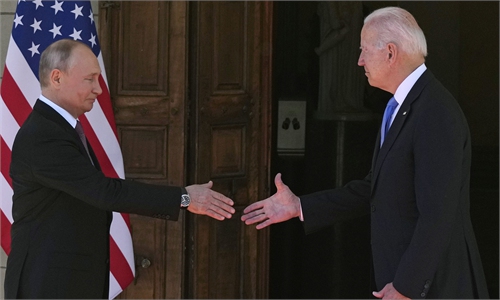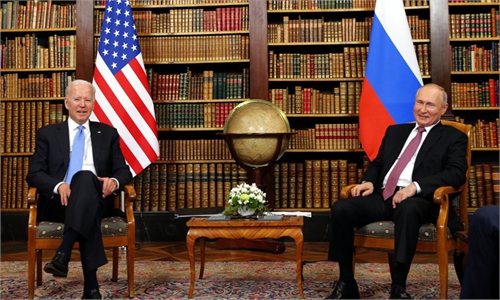US president ‘makes logical mistake’ in splitting China-Russia ties
Biden’s trip results in vague communiqués but ‘no concrete achievements’

US President Joe Biden (left) and Russian President Vladimir Putin meet at the Villa La Grange in Geneva, Switzerland, on Wednesday. Photo: Xinhua
US President Joe Biden has finished his trip to Europe, which is his first major diplomatic event since he assumed the presidency. But apart from a series of vague communiqués with his allies and a meeting with Russian President Vladimir Putin, which ended with no significant breakthroughs, there is nothing Biden can show to his people regarding his diplomatic efforts.
Biden, at least on the surface, has fixed transatlantic relations, which had been seriously damaged by Donald Trump, reached some vague consensuses with his G7 and NATO allies on confronting China and Russia. However, none of those communiqués demonstrate how much resources and money the US would want to give for such magnificent goals, said Chinese experts.
Trump was not welcome in Europe, but he could still show something concrete to Americans, such as how much money he had forced US allies to pay, pleasing some US voters, analysts said. They predicted that in the next few weeks, Biden's approval rating might slightly drop because of the lackluster visit to Europe.
'China' all the time
Although there were no concrete outcomes that could make US allies or American people happy, China was the topic that persisted all the way through Biden's trip, even in his one-man press conference after his meeting with Putin in Geneva on Wednesday.
The word "China" wasn't even included in a question raised by a reporter at the conference, which is about the potential of a new cold war between the US and Russia, but Biden, in his answer, said that "let me ask a rhetorical question: You [Russia] got a multi-thousand-mile border with China. China is moving ahead… seeking to be the most powerful economy in the world and the largest and the most powerful military in the world."
"Your [Russian] economy is struggling; you need to move it in a more aggressive way, in terms of growing it… I don't think he's [Putin) looking for a Cold War with the US," Biden recalled on his talk with Putin while answering the question.
Jin Canrong, associate dean of the School of International Studies at the Renmin University of China, told the Global Times on Thursday that "apparently, just as most people had predicted before the Putin-Biden meeting, Biden would definitely create some discord for China-Russia relations in his talk with Putin, but his approach was extremely poor and it would bring no effect."
"China's economic development is not a threat to Russia, but an opportunity. This is common sense for both China and Russia. Hilariously, Biden told Putin that the Russian economy is struggling and he even tried to use this point to split China-Russia ties. Can he tell the difference between who is making the Russian economy struggle and who is helping Russia overcome economic difficulties?" Jin said.
The US is the one that is making great efforts to sanction, contain and isolate Russia. China is the country which is always providing a helping hand and promoting trade with Russia, so Biden had made a very serious logical mistake, seriously underestimating Putin's intelligence and experience, Lü Xiang, a research fellow in US studies at the Chinese Academy of Social Sciences in Beijing, told the Global Times.
The Biden-Putin summit concluded with no significant breakthroughs, but it has at least shown that US-Russia tensions have eased a little bit, so there are some positives that have come from this. It is still far from a diplomatic success though, Jin said.
"Interestingly, Biden had an argument with a CNN reporter in his press conference. We used to think this could happen only between Trump and the US mainstream media. This shows Biden is anxious and lacks confidence in dealing with tough questions. He can only speak fluently about vague ideas like democracy, human rights and so on, but when he talks about concrete issues, he gets muddled," Lü said.
"Is a summit with China next?" some journalists asked Biden toward the end of the press conference but the US president didn't answer. Jin said Biden doesn't have the confidence to raise the initiative to China yet, and China doesn't believe such a summit is urgent.
Is America back?
One major goal of Biden's visit to Europe was to convince US allies that the US is back, which was partly achieved considering the atmosphere of the events, including the G7 summit, the US-EU summit and the NATO summit.
Cui Hongjian, director of the Department of European Studies at the China Institute of International Studies, told the Global Times on Thursday that Europe's concerns over the US' respect for multilateralism, commitment to allies and democratic values were assured to a certain extent, though the shadow of Trump administration still lasts.
But when Biden shouted America is back, what he meant was "America was back to leadership," which the visit failed to realize, Cui said.
Biden planned to rally his allies against China under US leadership again, but although the G7 and NATO communiqués showed a harsher stance, the changes did not reach the level the US had wanted, Cui said, citing European countries' remarks outside the events as further evidence.
German, Italian and leaders of the EU in particular were opposed dealing with China in a confrontational manner at the G7 session.
As for the US and Russia, both sides wanted to stabilize relations after a chaotic four years, and both sought to confront each other in a more predictable manner. But the Putin-Biden meeting was more of verifying bottom lines and avoiding direct military conflict or misjudgments than really do something to improve diplomatic relations, Cui said.
Lü said that Biden was unable to convince European leaders not to worry about the next power transition in the US. Now America is a seriously divided country, and if the Republicans, Trump or Trumpism return to power, transatlantic ties will see another wave of hits. "America can come back, but it can also leave again. That is another reason why European countries want to keep their distance with the US."




